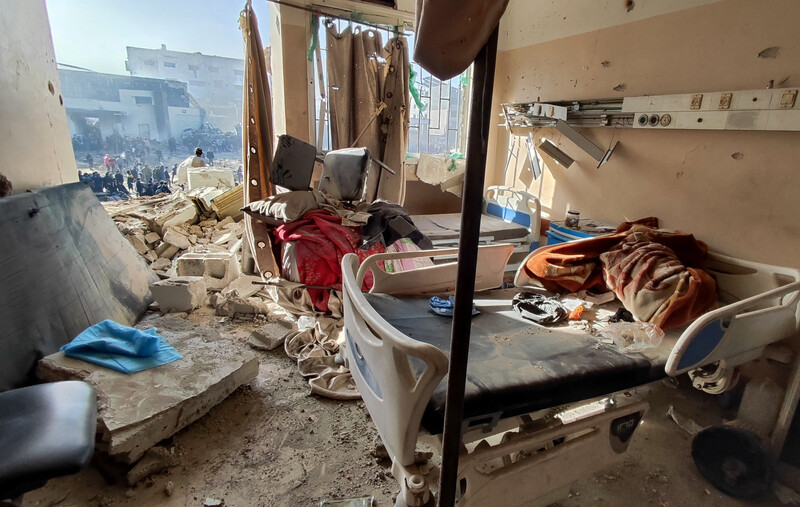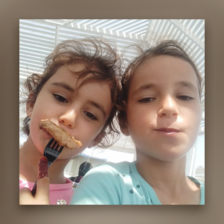The Electronic Intifada 16 December 2024

A view from al-Shifa Hospital in Gaza City after an Israeli military siege and attack on the hospital complex in April 2024.
APA imagesSara Salman, 17, was at home in Jabaliya when an Israeli airstrike hit her family’s house on 4 December 2023.
The impact was so powerful, she was blown into a wall and landed on her back on the ground.
“When I woke up,” Sara told The Electronic Intifada, “I couldn’t move any part of my body.”
After about 10 minutes, Sara managed to move her right hand. She reached out to touch her legs but couldn’t feel them. She realized she was paralyzed.
“I was barely breathing and was screaming in pain,” she said.
After about half an hour, a man pulled Sara from under the rubble, put her on a donkey cart and took her to the Kamal Adwan hospital in Beit Lahiya.
Sara’s back was broken, and the doctors said she needed spinal stabilization and a tendon-lengthening surgery for her leg.
They were not, however, able to perform the required surgeries as they lacked the necessary medical equipment.
Israel has prevented most humanitarian aid from entering Gaza since last October and the situation is only worsening.
At the hospital, Sara received more devastating news. Not only was she partially paralyzed, but her brother Moatasem had been killed, her sister had lost her sight and her other sister’s hands had been amputated.
“Moatasem was a piece of my soul,” she said.
Besieged at two hospitals
Sara’s condition deteriorated severely when Israeli troops besieged the Kamal Adwan Hospital on 12 December 2023.
She had an IV line connected to her body that was supposed to be removed after three days – four, at most – but it stayed in for 15 days.
She said that during the siege, “there was no food, no water, no medicine. Nothing.”
An Israeli shell struck her room in the hospital and a fire broke out. Her mother was able to evacuate her to safety.
When the siege ended, her father took her on a donkey cart to a clinic. The doctor spent more than an hour dressing Sara’s wounds, which had become infected because of the IV line.
“I was just screaming in pain from the injury in my back,” Sara said.
Her father then took her to al-Shifa Hospital on the same donkey cart and secured a place for them in the hospital yard in a shipping container.
Many medical procedures were taking place in shipping containers – what Palestinians in Gaza call “barracks” – outside al-Shifa.
“Because my back was broken, I needed a proper mattress, but I didn’t have one because of the siege,” Sara said. “Sometimes I couldn’t sleep at night for the pain.”
Her father received a call from a friend who told him that Sara’s medical referral had been approved and that she would be transferred to Egypt for treatment.
On 18 March, however, the Israeli troops attacked and then besieged al-Shifa hospital during Ramadan.
Alone
Sara was separated from her family.
“The soldiers ordered anyone who could walk to leave southern Gaza. My family was forced to evacuate under threat,” she told The Electronic Intifada.
“My mother didn’t want to leave and neither did my father. The soldiers threatened them, claiming that they would be [deemed] terrorists if they didn’t leave.”
Tanks encircled the shipping container where she had been receiving treatment. Soldiers arrived and one of them raised his weapon, insisting that she had to walk.
“The doctor who had been treating me for four months yelled at the soldiers, ‘Her back is broken! Stop this!’”
The soldier pointed a gun at the doctor and told Sara again to stand up and walk.
The doctor, crying, lifted Sara up, telling her: “Try to stand up just a little bit, so they don’t take you.”
The pain was unbearable. She screamed, she told The Electronic Intifada, and was unable to breathe from the intensity of the pain.
“I cried out loud, ‘What have I done to deserve this?’”
She was eventually moved to one of the hospital’s buildings on a stretcher.
After the hospital had been forcibly emptied by Israeli soldiers, only some of the medical staff and those patients who were unable to walk remained.
Yet the soldiers continued to occupy the hospital and conduct inspections. Whenever they wanted to enter a building, they would order everyone to file out through loudspeakers.
Over and over, Sara was transferred by stretcher from one building to another.
She was eventually transferred to Kamal Adwan hospital, where she stayed until she was transferred south.
Waiting for evacuation to Egypt
On 16 April, she arrived in Khan Younis in the south of Gaza with her little sister Rahaf, 8.
Four days before she arrived in the south, however, the rest of her family – her parents and three other siblings – had traveled to Egypt for much-needed medical treatment.
Sara is currently receiving the bare minimum of treatment at a hospital in Khan Younis, but doctors are unable to conduct the operations she needs due to the lack of equipment and resources.
She is, in every sense of the word, stuck. She can’t walk because she needs surgery, and any wrong movement could paralyze her entirely. Yet she can’t receive surgery because hospitals in Gaza are not equipped.
She now hopes to go to Egypt to join her family and get some proper care, though she is one of an estimated 14,000 patients waiting to leave Gaza, which has been all but sealed since Israel took control of the Philadelphi corridor along the border with Egypt.
“Of course, like any injured person, my hope is to travel and to receive treatment. My family and I applied for the transfers together.”
She does not know why her family members received permits and she did not.
Ahmed al-Zrai, a physiotherapist working at Nasser Medical Complex, told The Electronic Intifada that medical treatment is near impossible in Gaza.
“Many essential medicines are now completely unavailable and the Israeli occupation prevents their entry, listing them as prohibited items,” he said. “The shortage of electricity, fuel, hospital beds and … anesthesia prevents many surgeries from being performed properly.”
Most surgeries or procedures, from amputations to stitching wounds, are performed without anesthesia, he said.
While al-Zrai is not treating Sara, he has treated patients with similar conditions who, due to the Israeli occupation and its blockade on medications, have “died within a month or less because treatment was unavailable and continuous healthcare couldn’t be provided.”
“I know patients who weren’t too serious,” he said, “but their conditions worsened significantly due to medical neglect and the lack of available treatments and necessary equipment because of the border closure.”
Roaa Shamallakh is a writer and translator from Gaza. Khaled El-Hissy is a journalist from Jabaliya in the Gaza Strip. Twitter: @khpalestined





